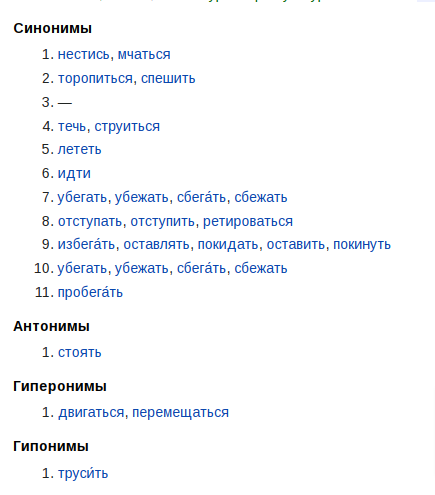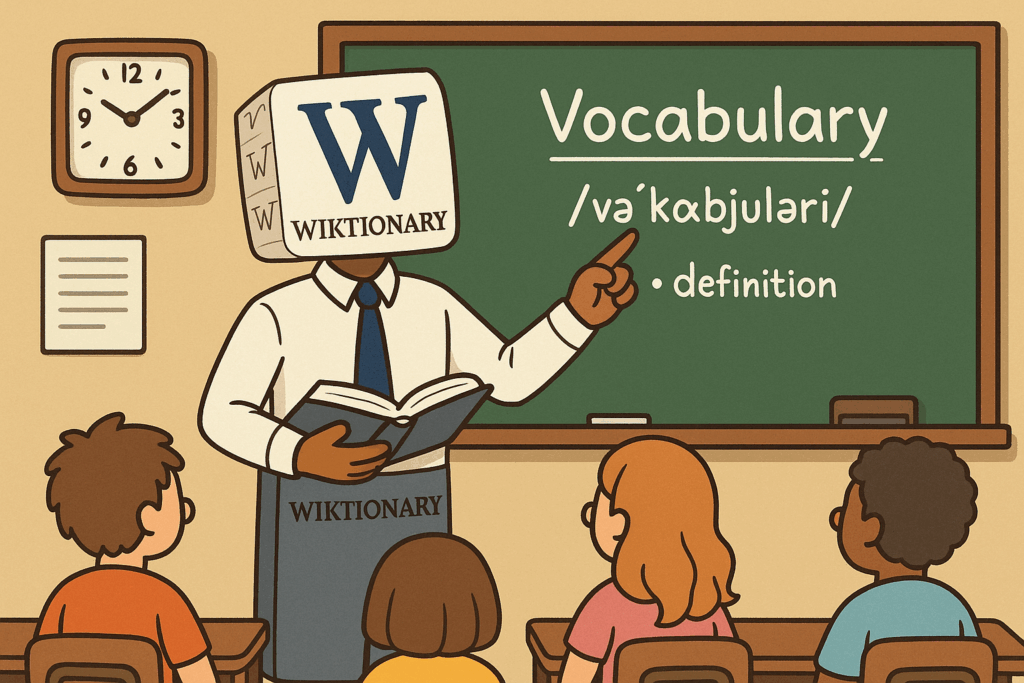Wiktionary, an online multilingual dictionary created and maintained by Wikimedia, is one of the tools I use literally every day. I consult Wiktionary for both my language learning and teaching tasks. It has become irreplaceable to me because the information it contains is so much more than just words and their translation! In this article, I’ll show you how to use Wiktionary to learn more than just new words.
Pronunciation
One of the biggest problems for adult language learners is that books, written language, are the main source of learning. Children learn a new language by ear. Adolescence is the perfect time to learn languages from songs. That’s how I learned English. Adult learners tend to limit their audio input. They focus on reading. My students often complain that they know this or that word, but they don’t recognize it in speech or even know how to pronounce it. Wiktionary can help you learn new words along with the correct pronunciation and acoustic image (i.e. how the words sound).
Every Russian word in Wiktionary has an IPA transcription in the pronunciation section, and many also have audio files.

If you can’t read IPA and the word you’re looking for doesn’t have an audio file yet, check Forvo for pronunciation help. Even if you are looking for a word that is not yet on Forvo, you can request a pronunciation and someone will read it for you in a very short time.
Grammatical Forms
This is my favorite feature of the Russian Wiktionary: grammar tables. Most words in the Russian Wiktionary have grammar tables with all possible grammatical forms for each word. As you know, Russian nouns and adjectives have a set of 12 different endings (6 case endings for each singular and plural). Russian verb conjugation is even more confusing, and there are also non-personal verb forms such as particles, imperative forms, and so on. You can find all this in the grammar tables in the Russian Wiktionary.
Next time when you need to look up the genitive plural for брат (brother), check Wiktionary.

Stress
This is part of the grammar tables, but worth mentioning separately: Wiktionary highlights stressed syllables.
Russian stress is chaotic, to say the least. In Russian, the stress can shift from one syllable to another, from the root to the prefix, and memorizing the patterns doesn’t seem to be the best strategy, because with multiple schemes come multiple exceptions. Wiktionary marks the stressed syllable not only in the main article, but also in each grammatical form in the grammar table, if it is available for the word. It is a great help for language learners to have the stress of each grammatical form marked.
When There Are More Than One Meaning
Any dictionary, good or bad, will give you multiple meanings for many words because, surprisingly, natural languages tend to have more polysemantic words, i.e., words with multiple meanings, than words with only one meaning. Wiktionary follows tradition and lists multiple meanings when applicable, usually in order from most common and general to least common and specific.
If you look closely at the word’s list of meanings, you’ll see what ties all those meanings together. You’ll gain a deeper understanding of the word’s meaning, and you’ll be better able to predict how the word can be used.
Synonyms and Antonyms
Wiktionary often lists synonyms and antonyms for most words. This feature helps language learners build their vocabulary more quickly. It also nuances the meaning of a word.
Sometimes knowing what the opposite of a particular word would be can provide much needed clarity. Working with synonyms and antonyms helps language learners see the world through the eyes of native speakers. Don’t skip this step, explore the synonyms and antonyms when learning a new word, and the time invested will pay off very quickly.

Derived Terms
Many Russian words have a list of words derived from them, most often meaning words with the same root. I don’t know why, but this feature is mostly available for Russian words in the English Wiktionary.
This section is helpful in two ways: first, it makes it easier to remember new words along with their derivatives, and second, it gives you information about the rules of word formation in Russian. You can learn how to make an adjective from a noun, or a verb from an adjective, or a verb from a noun, and so on. You can learn productive derivation algorithms and the most common suffixes simply by studying the lists of derived words.
Etymology
For me, the easiest way to memorize a new word and understand its meaning is to learn its etymology. Fortunately, Wiktionary provides etymological references for many Russian words. The English Wiktionary is less helpful, so I recommend switching to the Russian version of the dictionary for this.
As a source, the Russian Wiktionary often uses the golden standard, Max Vasmer’s Etymological Dictionary of the Russian Language. Understanding the reconstructed forms and meanings of the words may require some linguistic training, but it is easier than it seems. At the very least, you’ll see how the word you’re studying has changed in different languages, how its root has been transformed and acquired different meanings in different languages and at different times. For language enthusiasts like me, exploring the paths of roots is a pure fascination. But also from a practical point of view, it is the best way to understand how words are organized within a language.

Categories
Have you ever looked at the bottom of a Wiktionary page? Oh, it is a treasure trove! From lists of words with similar grammatical properties, to lists of quotations, to lists of Russian prefixes — you can find it all there. It is like a university course on the Russian language rearranged into various tables, lists, and cross-references.
What Wiktionary’s feature did I forget to mention? How do you use Wiktionary in your language studies? Please share this in the comments!

